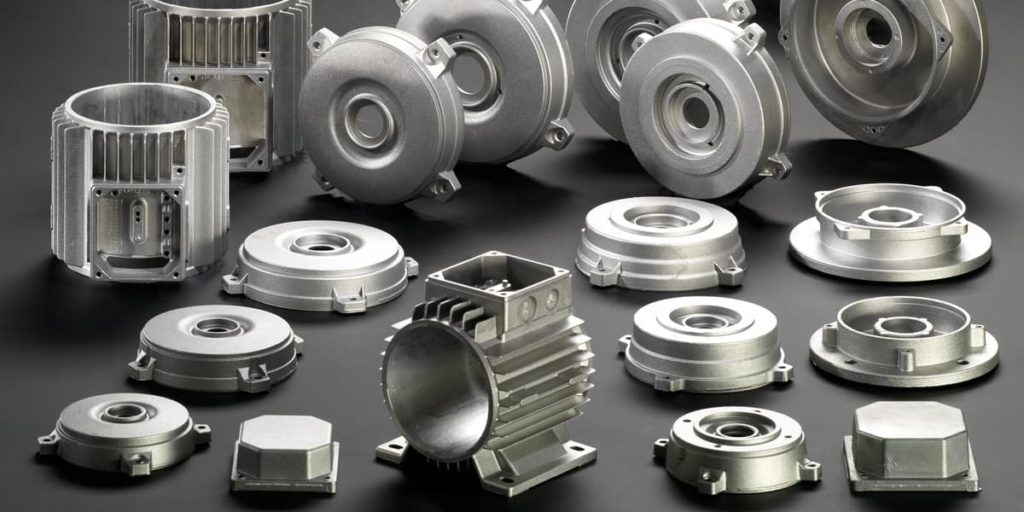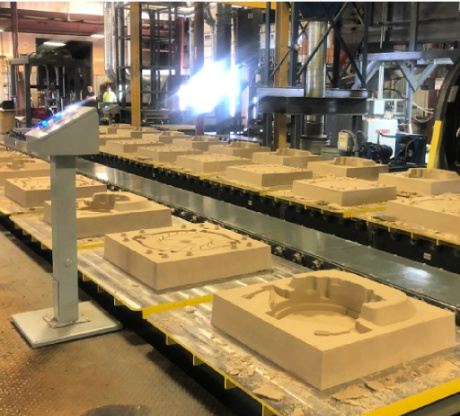How Aluminum Foundry expertise ensures high-quality results
Wiki Article
Recognizing the Duty of Aluminum Foundry in Creating High-Quality Steel Products
Aluminum factories are necessary in the production of high-quality steel items. They utilize numerous casting strategies, such as sand and pass away casting, to attain accuracy and toughness. With rigorous quality assurance procedures in location, these facilities assure that their products fulfill industry standards. As markets evolve, the duty of Aluminum factories proceeds to adapt. This increases questions about future technologies and sustainability methods that may redefine their influence.The Aluminum Casting Process: Technologies and strategies
The Aluminum casting procedure has advanced substantially, including different strategies and innovations that enhance performance and product quality. Commonly, methods such as sand casting and pass away spreading were primary; nonetheless, improvements have presented processes like investment spreading and low-pressure die spreading. These advancements allow makers to attain detailed styles and tighter tolerances, minimizing material waste and improving overall performance.The assimilation of computer-aided layout (CAD) and simulation software permits for even more precise modeling and testing, making sure that possible problems are determined early in the manufacturing cycle. Aluminum Foundry. Additionally, developments in alloy formulas lead to improved mechanical residential properties and corrosion resistance
These growths not only simplify manufacturing but likewise advertise sustainability by lessening power intake and exhausts. As the industry remains to embrace new technologies, the Aluminum casting procedure remains a vital element in creating high-grade steel items that meet varied market needs.
Applications of Aluminum in Numerous Industries
Aluminum's adaptability and positive residential properties make it a valuable material across various industries. In the auto field, Aluminum is commonly made use of for its lightweight attributes, adding to improved gas effectiveness and efficiency. The aerospace market additionally advantages, as aluminum's high strength-to-weight ratio enhances aircraft style while keeping safety requirements.In building and construction, Aluminum is preferred for its longevity and resistance to corrosion, making it ideal for window structures, roof, and architectural elements. The product packaging industry leverages aluminum's safe nature and recyclability, especially in food and beverage containers, making sure security and sustainability.
Additionally, the electrical market uses Aluminum for its exceptional conductivity in electrical wiring and transmission lines. The durable goods industry uses Aluminum in products ranging from kitchen tools to electronic devices, emphasizing its flexibility. Consequently, Aluminum plays a vital function in boosting functionality, performance, and sustainability across diverse applications.
Benefits of Making Use Of Aluminum Over Various Other Steels
While several metals are employed in different applications, Aluminum stands out because of its one-of-a-kind combination of buildings that provide several advantages over various other materials. Its lightweight nature significantly minimizes transportation expenses and energy usage, making it excellent for sectors such as vehicle and aerospace. Aluminum's excellent corrosion resistance boosts resilience, expanding the life of products and minimizing maintenance needs. Additionally, it displays high thermal and electrical conductivity, making it ideal for electric and thermal management applications.The steel's pliability allows for complex forms and detailed layouts, giving adaptability in manufacturing procedures. Light weight aluminum is 100% recyclable without loss of top quality, advertising sustainability and decreasing ecological influence. These attributes, combined with its relatively inexpensive contrasted to various other steels, placement Aluminum as a Get More Info favored selection across different sectors. On the whole, the advantages of Aluminum add to its boosting popularity in the manufacturing of premium steel items

Quality Assurance Actions in Aluminum Foundries
Quality control steps play a necessary duty in the Aluminum Foundry procedure, ensuring that the end products satisfy strenuous sector requirements and consumer assumptions. These procedures usually start with material inspection, where read the full info here raw Aluminum is assessed for pureness and composition. As soon as the casting procedure begins, temperature control is important; preserving excellent molten metal temperature levels prevents problems such as porosity and shrinkage.Furthermore, non-destructive testing (NDT) techniques, including radiographic and ultrasonic examinations, are utilized to identify interior defects without damaging the spreadings. Aesthetic examinations are additionally conducted at numerous stages to identify surface area flaws.
Adherence to well established top quality administration systems, such as ISO criteria, is essential for maintaining consistency and traceability throughout the production process. Routine audits and staff member training on top quality standards contribute to a total society of quality, making certain that the items not only meet however exceed client expectations in efficiency and sturdiness.
The Future of Aluminum Foundries: Fads and Sustainability
As the Aluminum Foundry industry evolves, arising trends and an emphasis on sustainability are reshaping its landscape. Increasing need for durable and lightweight products in fields like auto and aerospace drives innovation in Aluminum casting methods. Advanced modern technologies, such as fabricated knowledge and automation, are boosting production effectiveness and accuracy while decreasing waste.Sustainability is ending up being a critical worry, motivating shops to execute eco-friendly methods, consisting check it out of reusing Aluminum scrap and using sustainable power resources. The shift towards circular economic situation concepts urges factories to minimize environmental influence while satisfying consumer assumptions for sustainable items.
Furthermore, regulative pressures are pressing the industry towards cleaner operations, cultivating partnership between manufacturers and ecological companies. As these fads merge, the future of Aluminum factories will likely be characterized by a commitment to sustainability, high quality, and effectiveness, ensuring their relevance in an affordable market.
Regularly Asked Questions
What Are the Environmental Effects of Aluminum Foundries?
Light weight aluminum factories add to ecological effects through power consumption, greenhouse gas emissions, and prospective air and water contamination. In addition, mining bauxite for Aluminum can lead to habitat devastation and dirt destruction, impacting local ecological communities.

How Do Shops Ensure Employee Safety And Security During Production?
Shops carry out extensive safety and security procedures, including safety devices, air flow systems, and regular training. They carry out risk evaluations and maintain safety and security requirements to reduce threats, guaranteeing a safer working environment for employees throughout the production procedure.What Accreditations Should an Aluminum Foundry Have?
A light weight aluminum Foundry ought to have accreditations such as ISO 9001 for high quality administration, ISO 14001 for environmental management, and OSHA conformity for security criteria. These accreditations ensure adherence to sector policies and commitment to high quality and safety and security methods.How Does Aluminum Recycling Affect Foundry Operations?
Aluminum recycling significantly boosts Foundry procedures by offering an economical resources source, minimizing energy usage, and decreasing environmental effect - Metal Castings. It additionally motivates sustainable practices, permitting foundries to maintain competitiveness in a rapidly advancing marketWhat Prevail Defects in Aluminum Castings?
Common flaws in Aluminum spreadings consist of porosity, shrinking, additions, and surface area flaws. These issues can develop from inappropriate mold style, inadequate pouring methods, or contamination throughout the melting and casting processes, impacting overall item quality.
Report this wiki page